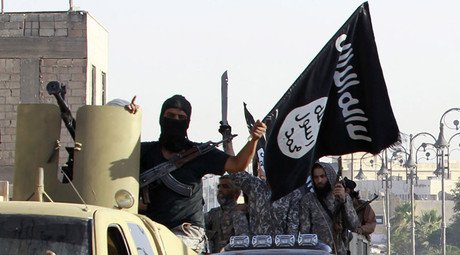Assad ‘is a factor’? US blames Syrian leader for its own failure to cut ISIS oil funding
Washington says it is Syrian President Assad’s regime that has undermined US efforts to cut off Islamic State’s funding. The terrorists remain well-heeled due to crude oil trade the sources of which the West studied in detail over a year ago.
“We got all coalition members all taking efforts to strangle ISIS access to foreign markets, banking system, looking into what they need to produce and sell oil and cut all that off; it’s essential,” US State Department spokesman Mark Toner has said when asked by RT reporter Gayane Chichakyan for “updates” on what the US is doing to curb ISIS financing.
However, Islamic State (IS, formerly ISIS/ISIL) remains well-funded despite all these steps. The US blames its lack of progress in stemming IS funding on President Assad, claiming he “is a factor here.”
“The black market, and Assad relies on ISIL oil and is a factor here. It’s hard to eliminate that completely, but we’re working on it,” Toner has said.
Last year, the US Treasury estimated that IS earns as much as $1 million a day by selling oil to some of its biggest enemies, allegedly including Turkey, Iraq’s Kurdish community, and the regime of Bashar Assad. All three sides have denied the allegations, which were voiced in October 2014 by David Cohen, a US terrorism and financial intelligence chief.
Qatari intelligence chief spurns #ISIS funding allegations http://t.co/M1oTf45yFnpic.twitter.com/cjPoBC7np6
— RT UK (@RTUKnews) October 27, 2014The US considers taking out Islamic State’s sources of funding – primarily oil and gas – as well as its infrastructure as key “in waging a successful campaign against ISIL,” Toner told journalists last week.
“It’s a particular line of effort – one of those is about bombing its infrastructure. I don’t have airstrike stats on that, but it’s been a line of effort since day one – how do we cut off ISIL financing?” the State Department spokesman stressed again on Monday.
However, though over a year has passed since the Treasury evaluated IS assets, the US is still working on curbing Syria’s oil transit routes to Turkey.
“There’s an area in the border that we want to seal up – and trying to cut off major supply routes to Turkey. It’s a bit of an ongoing challenge,” Toner said on Monday.
The New York Times on Monday said a US airstrike had destroyed at least 116 trucks used by Islamic State to smuggle crude oil.
When asked to confirm that by RT’s Chichakyan, the State Department refused to comment, saying such a question was at “a level of details to ask the DOD [Department of Defense].”
“Talked about it on Friday – how do we cut off ISIS financing is a big question, and we know they gain a chunk of financing that way. That’s always been a matter of targeting of these strikes, but I don’t know about the specific one you’re mentioning,” Toner said.
According to Chichakyan, the spokesman could not offer any explanation as to why strikes targeting IS’ oil convoys have only just begun. Incidentally, news of the first such strike broke the same day as Russian President Vladimir Putin showed his G20 counterparts satellite images that he said “clearly demonstrate the scale of the illegal trade in oil and petroleum products” between ISIS and some 40 unspecified countries.
According to Putin, “the motorcade of refueling vehicles stretched for dozens of kilometers, so that from a height of 4,000 to 5,000 meters they stretch beyond the horizon.”
Back in October, the Financial Times speculated that “the importance of Isis oil to those living in rebel-held areas of Syria is one reason why the US-led coalition has been reluctant to target the group’s trade routes.”
US airstrikes destroy more than 100 #ISIS oil trucks in #Syriahttps://t.co/Q846cSmd06pic.twitter.com/xoLxyKM5Tu
— RT (@RT_com) November 17, 2015The US-led coalition has reportedly said that it is “wary of alienating local populations by bombing fuel now critical for their daily lives.” It is not clear what developments prompted Washington to launch the long-overdue strike on Islamic State’s oil route, but The New York Times reported that the decision had been made “well before the terrorist attacks in and around Paris on Friday.”













